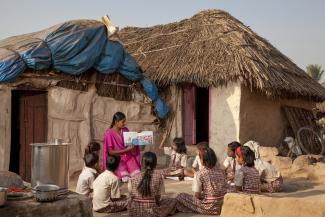Twenty-one-year old Phul Kumari, who is from Jharkhand, a state in the eastern part of India, is known as a “Girls’ Champion” in her home village. And for good reason! Raised in a poor family, she was married off immediately after her Class 10 examinations at just 16 years of age. Her husband was an abusive man and though she stayed in the marriage for three years, the physical and mental torture forced her to make the difficult decision to return to her mother’s house.
Despite this early trauma, Kumari, always a bright student, continued her studies and is now pursuing her Master’s Degree in Chemistry, something almost unheard of for girls in her community. This is thanks, in part to, the USAID-supported 10-19 Collaborative, which works with funders, non-profit organizations, and government and technical experts to reach five million adolescents, drive collaborative action, and build an enabling ecosystem to improve outcomes for adolescent girls. Donors are paired with support organizations and initiatives to delay the age at marriage, delay early pregnancy, encourage the completion of secondary education, and improve the agency of adolescents. One of these initiatives is the Quest Alliance’s Anandshala program, which is helping school systems to ensure that every child stays, engages, and learns in school. Through Anandshala, Kumari received support and training that built her self-confidence and leadership skills and helped her continue to pursue her dreams.
With newly acquired skills, Kumari became a “Girls’ Champion,” whose zeal to continue her studies despite poverty and the circumstances of her abusive marriage has made her an immensely popular role model for the girls in her village. She now helps other girls stay on track to lead healthy and productive lives and has become so successful that she is now a trainer for other Girls’ Champions. Recently, local officials asked Kumari to manage a government initiative in her area, the Didi Kitchen, a community kitchen that focuses on feeding poor families and children made particularly vulnerable due to the COVID-19 pandemic.
Reflecting on the training she received, Kumari says: "Today I understand how important education is for girls. If I didn't continue my studies, I would have not been independent and would have been unable to break myself from the shackles of undue torture and trauma like most of our women. The Anandshala program taught me to dream. Education is everyone’s right, whether it is a boy or a girl. We will not be able to break the evils of society unless we are educated. I want to inspire the girls in my community to continue their studies and set a goal to achieve in their life.”

